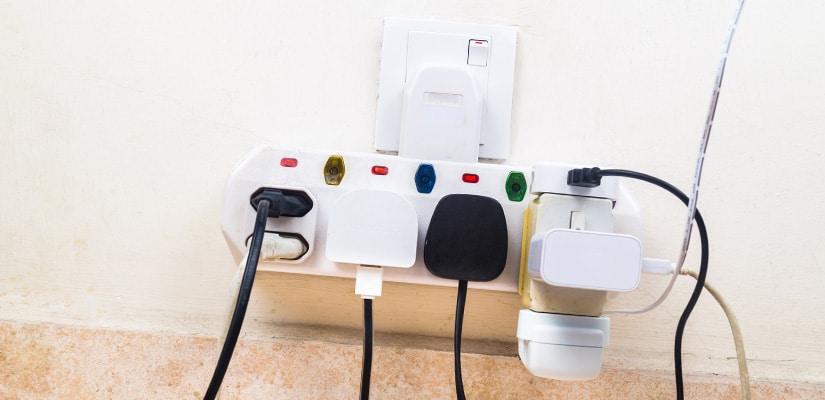Most homeowners would be shocked to learn that over 25,000 residential electrical fires occur annually in the United States. And even more upsetting is that many could have been easily avoided. But we never like to think about these bad things happening in our homes. However, we should all be aware of the causes of electrical fires, not to live in fear of them, but to take simple precautions to avoid them. These five tips could save your life or the life of a loved one.
- Never overload an electrical outlet. Each outlet is only meant to power two items. So when you begin adding power strips and adaptors to allow for more things to be plugged in, you are placing too much demand on that part of your home’s electrical system. The results can be catastrophic, including overheated wires and a fire inside the walls of your home. Instead of misusing a power strip or extension cord, call a licensed electrician to get a price quote to add more electrical outlets to your home. It is the only safe solution.
- Only use GFCI outlets in moist conditions. These are the outlets with the small red and black tabs in the center that read “Test” and “Reset.” They have a special moisture sensor that will cut the power to the outlet to prevent hazardous electrical shocks in wet conditions. Only GFCI outlets should be installed near water in your kitchen, bathroom, laundry room, basement, and garage. These are also the only outlets that should be installed in weatherproof outdoor enclosures. If your home does not have GFCI outlets in these areas, call a licensed electrician for an estimate to correct this potentially life-threatening shortcoming to your home’s electrical service.
- Keep anything flammable away from outlets or electrical cords. When functioning correctly, outlets and power cords dissipate a small amount of heat. But it is often unnoticeable. Unfortunately, you have no way of knowing about an issue or failure of a cord or outlet until it is too late. Anything in the vicinity of the faulty cord or outlet will be exposed to extreme heat and can easily catch fire. The safest habit is to keep all flammable items away from these areas to eliminate the potential for a fire, even when there is a fault in the cord or outlet.
- Unplug Small Devices When Not In Use- A study found that the average household has 50 small electronics or appliances plugged in at any given time. Of course, you will not unplug the television or refrigerator when you leave the house. But these items are designed with added safety features to reduce the risk of starting an electrical fire. Electrical fires are often started by inexpensive small appliances or electronics that are not designed to remain plugged in constantly. Take that extra second to unplug these potentially hazardous items and keep your loved ones and home safe.
- Replace Old Appliances- There is nothing wrong with get the most out of your hard-earned money. But when you are continuing to use old, dangerous appliances, you have gone too far. Any appliance with a frayed cord, damaged plug, or one that sparks or generates unexpected heat should be replaced. The cost of the new appliance pales in comparison to the cost of rebuilding your home after an electrical fire.
When you have any questions about electrical safety in your home, call (703) 463-9866. The licensed electricians at Circuit Doctor are here 24/7 to help keep your family and home safe from electrical hazards.


